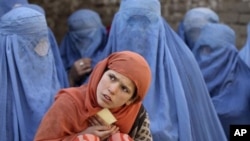The Afghan government says it plans to take control of women's shelters -- a move strongly opposed by international human rights groups.
This week, the Afghan Women's Affairs Minister said the government found problems in the operation of the shelters, including corruption and misuse of funds in the 11 registered safe houses run by non-governmental organizations.
VOA's Sarah Williams spoke with Rachel Reid, the Afghan researcher at Human Rights Watch in Kabul, who says a government shelter is "far more likely" to cave-in to pressure from families and tribes to hand back victims of domestic violence, putting women's lives at risk.
Why does the Afghan government want to take control of these women’s shelters?
"What the government is saying... is that they think there is corruption and there are often allegations of what they call 'immoral behavior' inside these shelters. I don’t think there’s any evidence for that. I think what’s really going on is that there are these very conservative groups in the government who don’t like the idea of shelters at all, they don’t like the idea of women even leaving their homes on their own. They might be beaten, forced into marriage as children, but actually that’s okay, that’s not a problem, that’s not grounds for them running away. Even the Supreme Court of the Afghan government says that it can be a crime for a woman to run away from home unless she goes to a government security department. And honestly, many women are afraid to go to the government when this happens to them because a lot of women get locked up and sent to prison for running away from home."
Are there some shelters that are now being operated by the Kabul government?
"There’s only one actually. There are about 13 or 14 shelters in operation, they’re almost all run by NGO’s [non-government organizations]. And about six are run by U.N. agencies. I’ve been working in Afghanistan for some years now, and I know some of the women who set up some of the first shelters after the Taliban fell, and they are extraordinary and really courageous women. This is not an easy task here, and often you’ll find that when women or girls seek shelter in these places, their families will come after them, often with threats... very serious death threats and intimidation.
"And so it takes a lot for these NGO’s to withstand that pressure. So another major concern with this government takeover is that the government will be less willing to withstand the pressure when it comes from powerful families or tribes that they want to keep happy. And it’s also a government that’s notorious for corruption, obviously one of the most corrupt governments in the world. And so I wouldn’t be surprised if bribery can play a role in getting women and girls out of these shelters when they should be absolutely protected."
No doubt a number of these women come to the shelters because they are in abusive situations. But in Afghanistan, there is a problem with forced marriages, and also marriages involving women that in the West would be considered underage.
"That’s right. The majority of marriages sadly are considered to be by most estimates either forced or child marriage, so that’s often the situation that women and girls are fleeing. There’s also endemic violence here, and I think an important sign of how bad things are are the rates of self-immolation, in which women are trying to commit suicide by burning themselves alive. In the west of Afghanistan, more than 80 women in less than a year have tried to kill themselves. So just one region gives you a sign of how desperate their situations can be and also how few avenues they see for escape and how desperately needed these shelters are."




